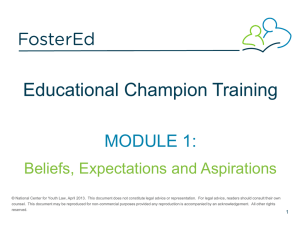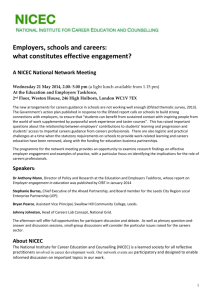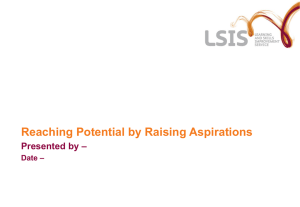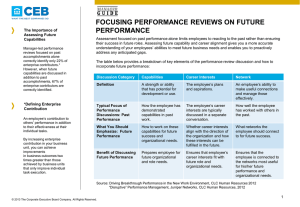Career Aspirations at Primary School
advertisement
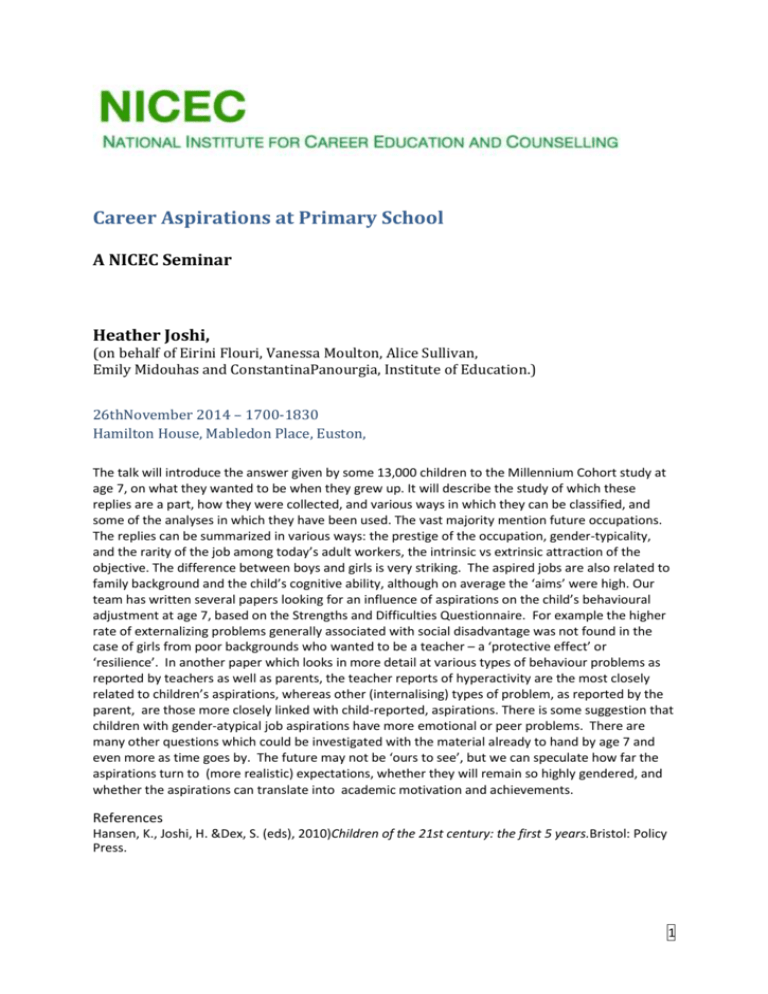
Career Aspirations at Primary School A NICEC Seminar Heather Joshi, (on behalf of Eirini Flouri, Vanessa Moulton, Alice Sullivan, Emily Midouhas and ConstantinaPanourgia, Institute of Education.) 26thNovember 2014 – 1700-1830 Hamilton House, Mabledon Place, Euston, The talk will introduce the answer given by some 13,000 children to the Millennium Cohort study at age 7, on what they wanted to be when they grew up. It will describe the study of which these replies are a part, how they were collected, and various ways in which they can be classified, and some of the analyses in which they have been used. The vast majority mention future occupations. The replies can be summarized in various ways: the prestige of the occupation, gender-typicality, and the rarity of the job among today’s adult workers, the intrinsic vs extrinsic attraction of the objective. The difference between boys and girls is very striking. The aspired jobs are also related to family background and the child’s cognitive ability, although on average the ‘aims’ were high. Our team has written several papers looking for an influence of aspirations on the child’s behavioural adjustment at age 7, based on the Strengths and Difficulties Questionnaire. For example the higher rate of externalizing problems generally associated with social disadvantage was not found in the case of girls from poor backgrounds who wanted to be a teacher – a ‘protective effect’ or ‘resilience’. In another paper which looks in more detail at various types of behaviour problems as reported by teachers as well as parents, the teacher reports of hyperactivity are the most closely related to children’s aspirations, whereas other (internalising) types of problem, as reported by the parent, are those more closely linked with child-reported, aspirations. There is some suggestion that children with gender-atypical job aspirations have more emotional or peer problems. There are many other questions which could be investigated with the material already to hand by age 7 and even more as time goes by. The future may not be ‘ours to see’, but we can speculate how far the aspirations turn to (more realistic) expectations, whether they will remain so highly gendered, and whether the aspirations can translate into academic motivation and achievements. References Hansen, K., Joshi, H. &Dex, S. (eds), 2010)Children of the 21st century: the first 5 years.Bristol: Policy Press. 1 Flouri, E. &Panourgia C. (2012). Do primary school children’s career aspirations matter? The relationship between family poverty, career aspirations and emotional and behavioural problems. Centre for Longitudinal Studies Working Paper 2012/5. IOE, London Flouri, E., Moulton, V. &Panourgia, C. (2012). MCS data note: Coding the aspirations of children at age 7 in the Millennium Cohort Study Centre for Longitudinal Studies. London: IOE Personal data To encourage networking, we normally publish the names and mail addresses of all those who attend NICEC events to other attenders. If you do not wish your name and email address to be circulated in this way please notify Stephen McNair when you book your place. Booking Please book with Stephen McNair, NICEC Fellow. Email stephen.mcnair@niace.org.uk Tel. 01603 737830 Attendance is free of charge to NICEC Fellows and Members, on a first come first served basis up to a maximum attendance of 40 people. If applications exceed this number, a waiting list will be kept in case there are cancellations. If your plans change, please email Stephen as soon as possible, so that your place can be reallocated. Participants who are not NICEC Fellows or Members: please send a cheque for £40 contribution to speakers' expenses, room hire and lunch, or bring cash on the day. Cheques payable to: NICEC Ltd., Dr Charles Jackson (NICEC Treasurer), 9 Preston Park Avenue, Brighton BN1 6HJ. Ask for an invoice if you need one. Those who become members of NICEC for 2014-15 will be able to recover this charge 2 2
